Money Laundering in Nigerian Corporations and Business Law: A Report
VerifiedAdded on 2023/04/23
|8
|2254
|419
Report
AI Summary
This report delves into the complexities of money laundering within the context of Nigerian corporations and business law. It begins by defining money laundering and tracing its evolution in Nigeria, highlighting the enactment of the Money Laundering (Prohibition) Act, 2004. The report examines key provisions of the Act, including those related to transaction limits, reporting requirements, and customer verification. It then explores the concept of 'knowing or suspecting' in relation to money laundering, differentiating between parties involved and those aiding the process. The concept of wilful blindness and available defenses are discussed. Finally, the report outlines red flags that financial institutions should be aware of, including inadequate customer information, inconsistent financial transactions, and cross-border transactions, emphasizing the importance of reporting suspicious activities to the appropriate authorities. The report underscores the need for continuous monitoring and ethical practices within financial institutions to combat money laundering effectively.
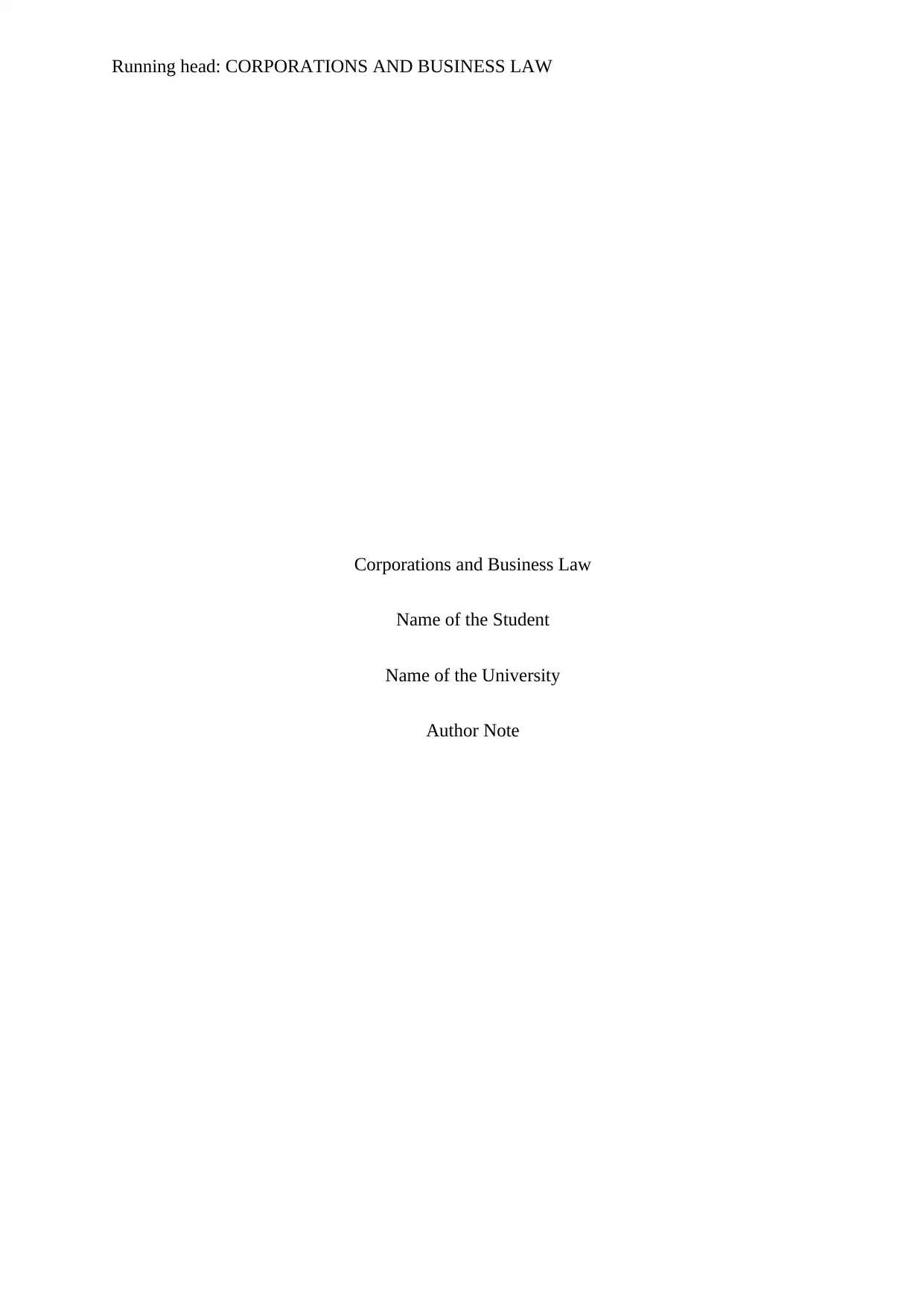
Running head: CORPORATIONS AND BUSINESS LAW
Corporations and Business Law
Name of the Student
Name of the University
Author Note
Corporations and Business Law
Name of the Student
Name of the University
Author Note
Paraphrase This Document
Need a fresh take? Get an instant paraphrase of this document with our AI Paraphraser
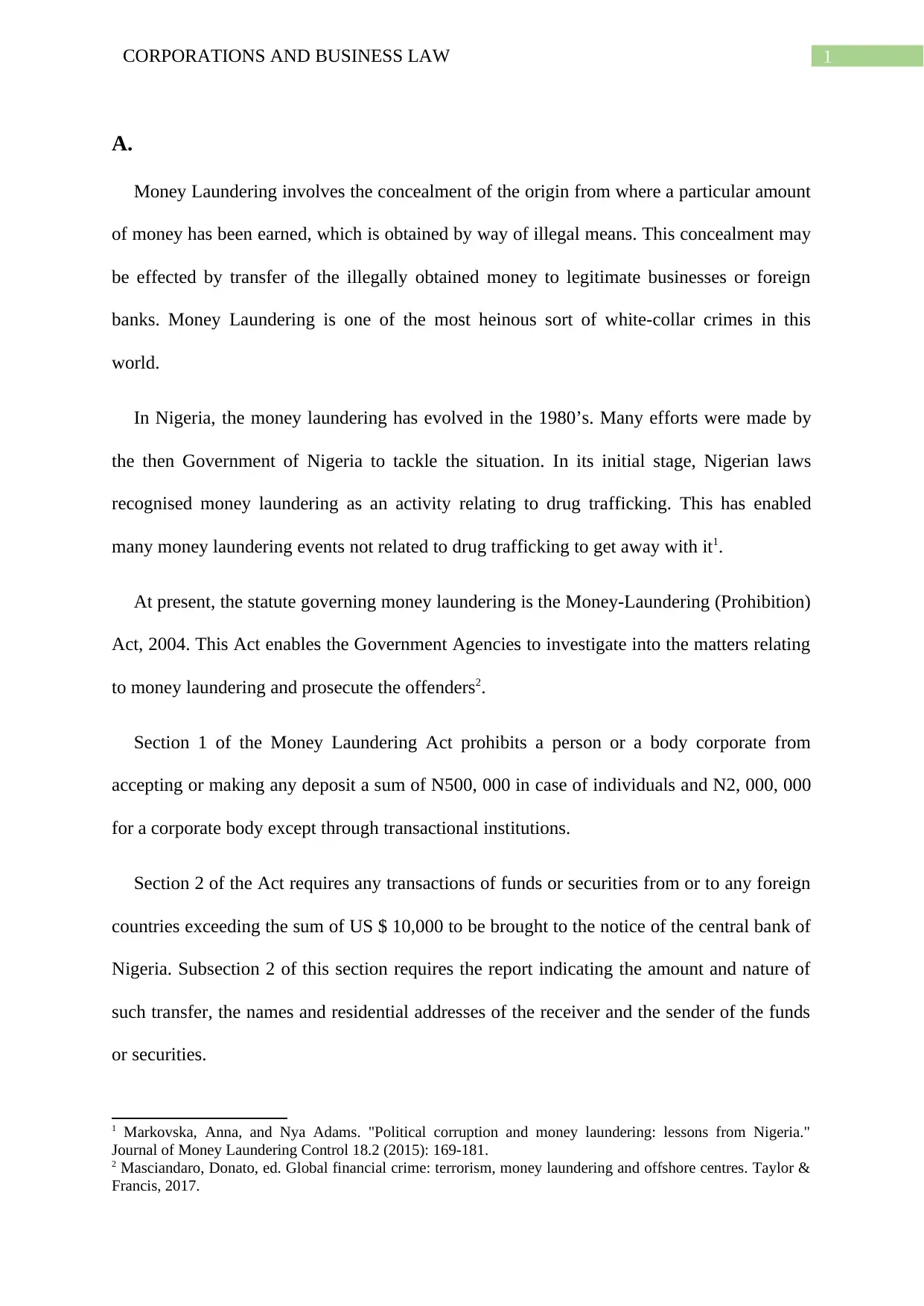
1CORPORATIONS AND BUSINESS LAW
A.
Money Laundering involves the concealment of the origin from where a particular amount
of money has been earned, which is obtained by way of illegal means. This concealment may
be effected by transfer of the illegally obtained money to legitimate businesses or foreign
banks. Money Laundering is one of the most heinous sort of white-collar crimes in this
world.
In Nigeria, the money laundering has evolved in the 1980’s. Many efforts were made by
the then Government of Nigeria to tackle the situation. In its initial stage, Nigerian laws
recognised money laundering as an activity relating to drug trafficking. This has enabled
many money laundering events not related to drug trafficking to get away with it1.
At present, the statute governing money laundering is the Money-Laundering (Prohibition)
Act, 2004. This Act enables the Government Agencies to investigate into the matters relating
to money laundering and prosecute the offenders2.
Section 1 of the Money Laundering Act prohibits a person or a body corporate from
accepting or making any deposit a sum of N500, 000 in case of individuals and N2, 000, 000
for a corporate body except through transactional institutions.
Section 2 of the Act requires any transactions of funds or securities from or to any foreign
countries exceeding the sum of US $ 10,000 to be brought to the notice of the central bank of
Nigeria. Subsection 2 of this section requires the report indicating the amount and nature of
such transfer, the names and residential addresses of the receiver and the sender of the funds
or securities.
1 Markovska, Anna, and Nya Adams. "Political corruption and money laundering: lessons from Nigeria."
Journal of Money Laundering Control 18.2 (2015): 169-181.
2 Masciandaro, Donato, ed. Global financial crime: terrorism, money laundering and offshore centres. Taylor &
Francis, 2017.
A.
Money Laundering involves the concealment of the origin from where a particular amount
of money has been earned, which is obtained by way of illegal means. This concealment may
be effected by transfer of the illegally obtained money to legitimate businesses or foreign
banks. Money Laundering is one of the most heinous sort of white-collar crimes in this
world.
In Nigeria, the money laundering has evolved in the 1980’s. Many efforts were made by
the then Government of Nigeria to tackle the situation. In its initial stage, Nigerian laws
recognised money laundering as an activity relating to drug trafficking. This has enabled
many money laundering events not related to drug trafficking to get away with it1.
At present, the statute governing money laundering is the Money-Laundering (Prohibition)
Act, 2004. This Act enables the Government Agencies to investigate into the matters relating
to money laundering and prosecute the offenders2.
Section 1 of the Money Laundering Act prohibits a person or a body corporate from
accepting or making any deposit a sum of N500, 000 in case of individuals and N2, 000, 000
for a corporate body except through transactional institutions.
Section 2 of the Act requires any transactions of funds or securities from or to any foreign
countries exceeding the sum of US $ 10,000 to be brought to the notice of the central bank of
Nigeria. Subsection 2 of this section requires the report indicating the amount and nature of
such transfer, the names and residential addresses of the receiver and the sender of the funds
or securities.
1 Markovska, Anna, and Nya Adams. "Political corruption and money laundering: lessons from Nigeria."
Journal of Money Laundering Control 18.2 (2015): 169-181.
2 Masciandaro, Donato, ed. Global financial crime: terrorism, money laundering and offshore centres. Taylor &
Francis, 2017.
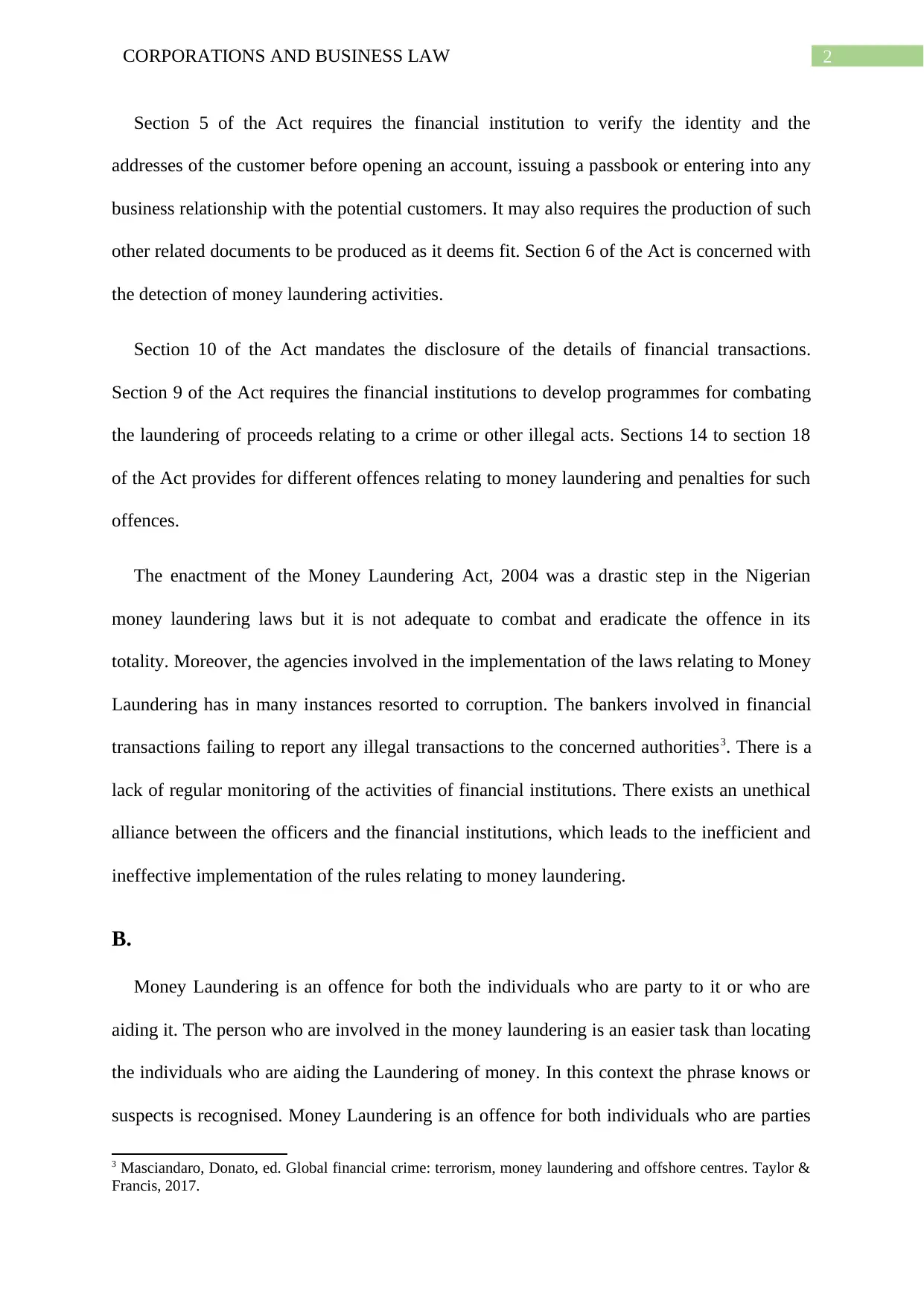
2CORPORATIONS AND BUSINESS LAW
Section 5 of the Act requires the financial institution to verify the identity and the
addresses of the customer before opening an account, issuing a passbook or entering into any
business relationship with the potential customers. It may also requires the production of such
other related documents to be produced as it deems fit. Section 6 of the Act is concerned with
the detection of money laundering activities.
Section 10 of the Act mandates the disclosure of the details of financial transactions.
Section 9 of the Act requires the financial institutions to develop programmes for combating
the laundering of proceeds relating to a crime or other illegal acts. Sections 14 to section 18
of the Act provides for different offences relating to money laundering and penalties for such
offences.
The enactment of the Money Laundering Act, 2004 was a drastic step in the Nigerian
money laundering laws but it is not adequate to combat and eradicate the offence in its
totality. Moreover, the agencies involved in the implementation of the laws relating to Money
Laundering has in many instances resorted to corruption. The bankers involved in financial
transactions failing to report any illegal transactions to the concerned authorities3. There is a
lack of regular monitoring of the activities of financial institutions. There exists an unethical
alliance between the officers and the financial institutions, which leads to the inefficient and
ineffective implementation of the rules relating to money laundering.
B.
Money Laundering is an offence for both the individuals who are party to it or who are
aiding it. The person who are involved in the money laundering is an easier task than locating
the individuals who are aiding the Laundering of money. In this context the phrase knows or
suspects is recognised. Money Laundering is an offence for both individuals who are parties
3 Masciandaro, Donato, ed. Global financial crime: terrorism, money laundering and offshore centres. Taylor &
Francis, 2017.
Section 5 of the Act requires the financial institution to verify the identity and the
addresses of the customer before opening an account, issuing a passbook or entering into any
business relationship with the potential customers. It may also requires the production of such
other related documents to be produced as it deems fit. Section 6 of the Act is concerned with
the detection of money laundering activities.
Section 10 of the Act mandates the disclosure of the details of financial transactions.
Section 9 of the Act requires the financial institutions to develop programmes for combating
the laundering of proceeds relating to a crime or other illegal acts. Sections 14 to section 18
of the Act provides for different offences relating to money laundering and penalties for such
offences.
The enactment of the Money Laundering Act, 2004 was a drastic step in the Nigerian
money laundering laws but it is not adequate to combat and eradicate the offence in its
totality. Moreover, the agencies involved in the implementation of the laws relating to Money
Laundering has in many instances resorted to corruption. The bankers involved in financial
transactions failing to report any illegal transactions to the concerned authorities3. There is a
lack of regular monitoring of the activities of financial institutions. There exists an unethical
alliance between the officers and the financial institutions, which leads to the inefficient and
ineffective implementation of the rules relating to money laundering.
B.
Money Laundering is an offence for both the individuals who are party to it or who are
aiding it. The person who are involved in the money laundering is an easier task than locating
the individuals who are aiding the Laundering of money. In this context the phrase knows or
suspects is recognised. Money Laundering is an offence for both individuals who are parties
3 Masciandaro, Donato, ed. Global financial crime: terrorism, money laundering and offshore centres. Taylor &
Francis, 2017.
⊘ This is a preview!⊘
Do you want full access?
Subscribe today to unlock all pages.

Trusted by 1+ million students worldwide
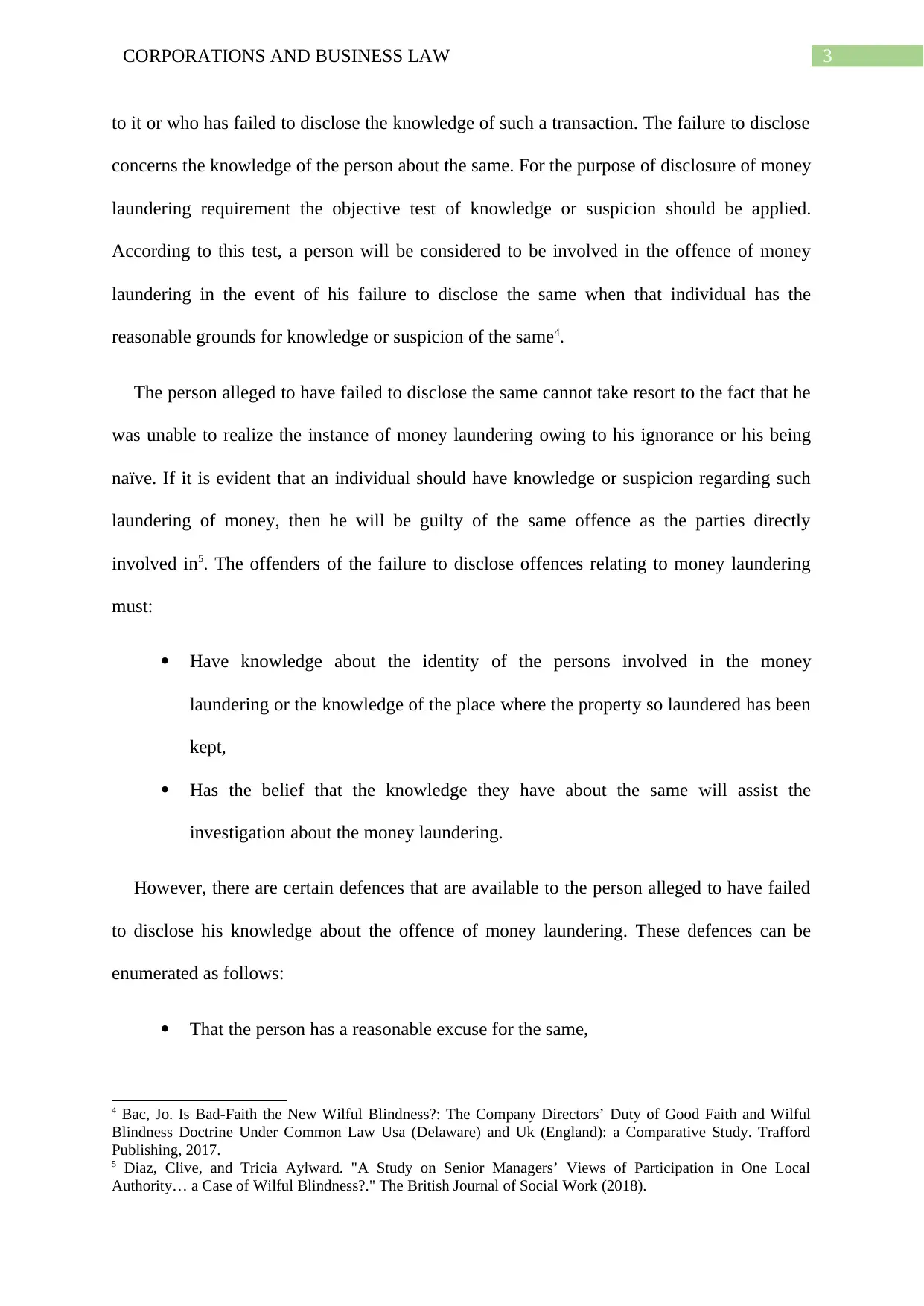
3CORPORATIONS AND BUSINESS LAW
to it or who has failed to disclose the knowledge of such a transaction. The failure to disclose
concerns the knowledge of the person about the same. For the purpose of disclosure of money
laundering requirement the objective test of knowledge or suspicion should be applied.
According to this test, a person will be considered to be involved in the offence of money
laundering in the event of his failure to disclose the same when that individual has the
reasonable grounds for knowledge or suspicion of the same4.
The person alleged to have failed to disclose the same cannot take resort to the fact that he
was unable to realize the instance of money laundering owing to his ignorance or his being
naïve. If it is evident that an individual should have knowledge or suspicion regarding such
laundering of money, then he will be guilty of the same offence as the parties directly
involved in5. The offenders of the failure to disclose offences relating to money laundering
must:
Have knowledge about the identity of the persons involved in the money
laundering or the knowledge of the place where the property so laundered has been
kept,
Has the belief that the knowledge they have about the same will assist the
investigation about the money laundering.
However, there are certain defences that are available to the person alleged to have failed
to disclose his knowledge about the offence of money laundering. These defences can be
enumerated as follows:
That the person has a reasonable excuse for the same,
4 Bac, Jo. Is Bad-Faith the New Wilful Blindness?: The Company Directors’ Duty of Good Faith and Wilful
Blindness Doctrine Under Common Law Usa (Delaware) and Uk (England): a Comparative Study. Trafford
Publishing, 2017.
5 Diaz, Clive, and Tricia Aylward. "A Study on Senior Managers’ Views of Participation in One Local
Authority… a Case of Wilful Blindness?." The British Journal of Social Work (2018).
to it or who has failed to disclose the knowledge of such a transaction. The failure to disclose
concerns the knowledge of the person about the same. For the purpose of disclosure of money
laundering requirement the objective test of knowledge or suspicion should be applied.
According to this test, a person will be considered to be involved in the offence of money
laundering in the event of his failure to disclose the same when that individual has the
reasonable grounds for knowledge or suspicion of the same4.
The person alleged to have failed to disclose the same cannot take resort to the fact that he
was unable to realize the instance of money laundering owing to his ignorance or his being
naïve. If it is evident that an individual should have knowledge or suspicion regarding such
laundering of money, then he will be guilty of the same offence as the parties directly
involved in5. The offenders of the failure to disclose offences relating to money laundering
must:
Have knowledge about the identity of the persons involved in the money
laundering or the knowledge of the place where the property so laundered has been
kept,
Has the belief that the knowledge they have about the same will assist the
investigation about the money laundering.
However, there are certain defences that are available to the person alleged to have failed
to disclose his knowledge about the offence of money laundering. These defences can be
enumerated as follows:
That the person has a reasonable excuse for the same,
4 Bac, Jo. Is Bad-Faith the New Wilful Blindness?: The Company Directors’ Duty of Good Faith and Wilful
Blindness Doctrine Under Common Law Usa (Delaware) and Uk (England): a Comparative Study. Trafford
Publishing, 2017.
5 Diaz, Clive, and Tricia Aylward. "A Study on Senior Managers’ Views of Participation in One Local
Authority… a Case of Wilful Blindness?." The British Journal of Social Work (2018).
Paraphrase This Document
Need a fresh take? Get an instant paraphrase of this document with our AI Paraphraser
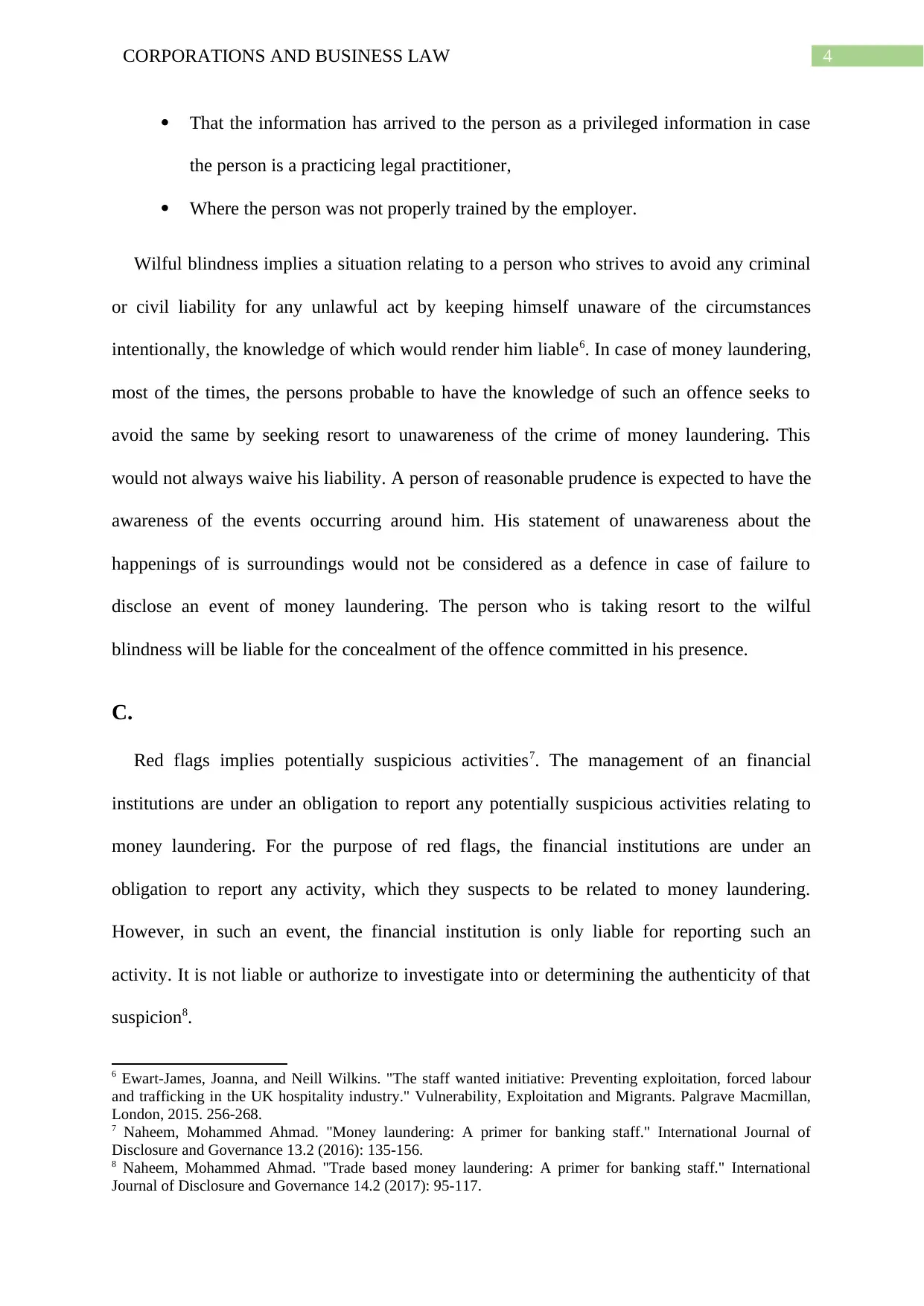
4CORPORATIONS AND BUSINESS LAW
That the information has arrived to the person as a privileged information in case
the person is a practicing legal practitioner,
Where the person was not properly trained by the employer.
Wilful blindness implies a situation relating to a person who strives to avoid any criminal
or civil liability for any unlawful act by keeping himself unaware of the circumstances
intentionally, the knowledge of which would render him liable6. In case of money laundering,
most of the times, the persons probable to have the knowledge of such an offence seeks to
avoid the same by seeking resort to unawareness of the crime of money laundering. This
would not always waive his liability. A person of reasonable prudence is expected to have the
awareness of the events occurring around him. His statement of unawareness about the
happenings of is surroundings would not be considered as a defence in case of failure to
disclose an event of money laundering. The person who is taking resort to the wilful
blindness will be liable for the concealment of the offence committed in his presence.
C.
Red flags implies potentially suspicious activities7. The management of an financial
institutions are under an obligation to report any potentially suspicious activities relating to
money laundering. For the purpose of red flags, the financial institutions are under an
obligation to report any activity, which they suspects to be related to money laundering.
However, in such an event, the financial institution is only liable for reporting such an
activity. It is not liable or authorize to investigate into or determining the authenticity of that
suspicion8.
6 Ewart-James, Joanna, and Neill Wilkins. "The staff wanted initiative: Preventing exploitation, forced labour
and trafficking in the UK hospitality industry." Vulnerability, Exploitation and Migrants. Palgrave Macmillan,
London, 2015. 256-268.
7 Naheem, Mohammed Ahmad. "Money laundering: A primer for banking staff." International Journal of
Disclosure and Governance 13.2 (2016): 135-156.
8 Naheem, Mohammed Ahmad. "Trade based money laundering: A primer for banking staff." International
Journal of Disclosure and Governance 14.2 (2017): 95-117.
That the information has arrived to the person as a privileged information in case
the person is a practicing legal practitioner,
Where the person was not properly trained by the employer.
Wilful blindness implies a situation relating to a person who strives to avoid any criminal
or civil liability for any unlawful act by keeping himself unaware of the circumstances
intentionally, the knowledge of which would render him liable6. In case of money laundering,
most of the times, the persons probable to have the knowledge of such an offence seeks to
avoid the same by seeking resort to unawareness of the crime of money laundering. This
would not always waive his liability. A person of reasonable prudence is expected to have the
awareness of the events occurring around him. His statement of unawareness about the
happenings of is surroundings would not be considered as a defence in case of failure to
disclose an event of money laundering. The person who is taking resort to the wilful
blindness will be liable for the concealment of the offence committed in his presence.
C.
Red flags implies potentially suspicious activities7. The management of an financial
institutions are under an obligation to report any potentially suspicious activities relating to
money laundering. For the purpose of red flags, the financial institutions are under an
obligation to report any activity, which they suspects to be related to money laundering.
However, in such an event, the financial institution is only liable for reporting such an
activity. It is not liable or authorize to investigate into or determining the authenticity of that
suspicion8.
6 Ewart-James, Joanna, and Neill Wilkins. "The staff wanted initiative: Preventing exploitation, forced labour
and trafficking in the UK hospitality industry." Vulnerability, Exploitation and Migrants. Palgrave Macmillan,
London, 2015. 256-268.
7 Naheem, Mohammed Ahmad. "Money laundering: A primer for banking staff." International Journal of
Disclosure and Governance 13.2 (2016): 135-156.
8 Naheem, Mohammed Ahmad. "Trade based money laundering: A primer for banking staff." International
Journal of Disclosure and Governance 14.2 (2017): 95-117.
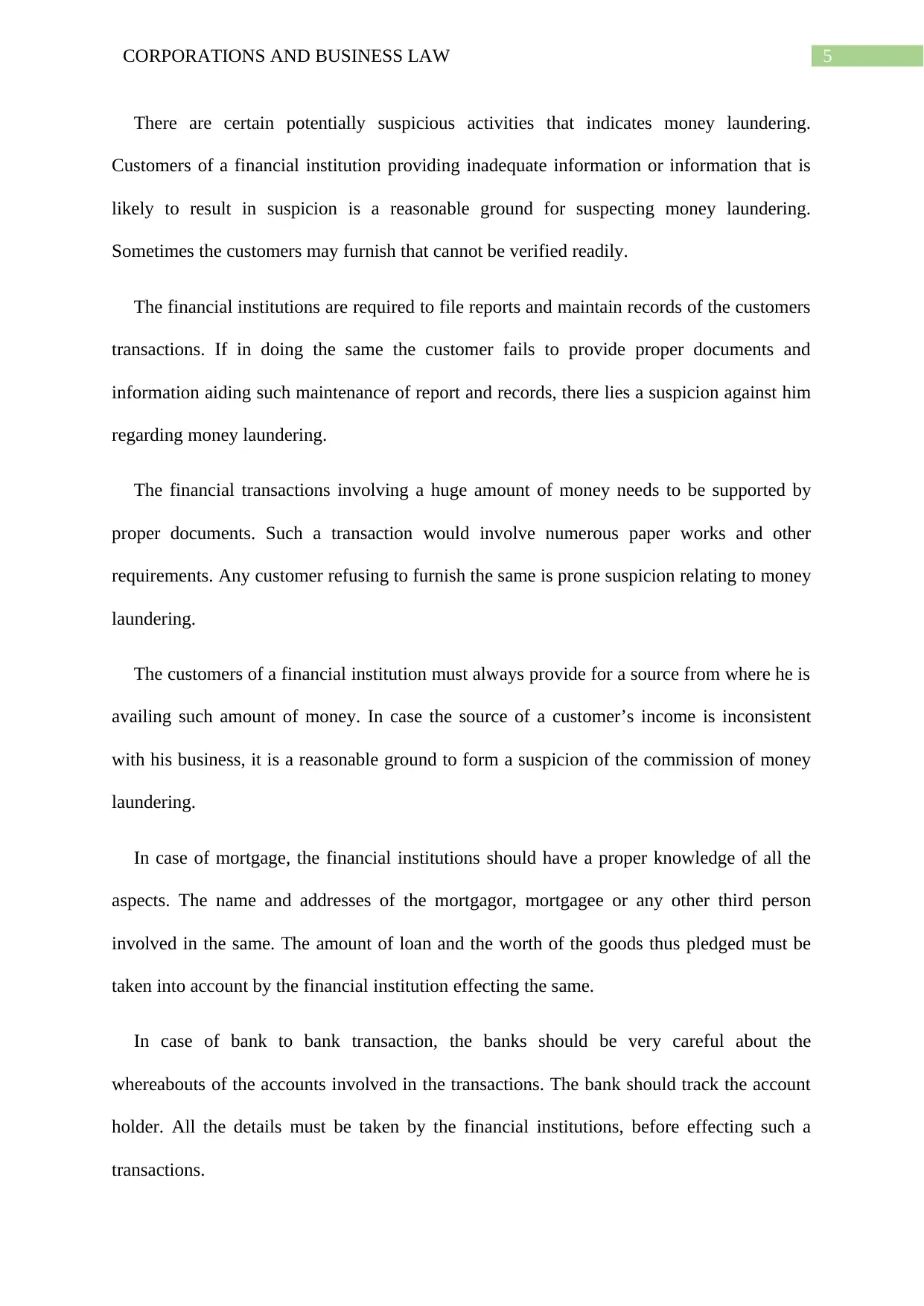
5CORPORATIONS AND BUSINESS LAW
There are certain potentially suspicious activities that indicates money laundering.
Customers of a financial institution providing inadequate information or information that is
likely to result in suspicion is a reasonable ground for suspecting money laundering.
Sometimes the customers may furnish that cannot be verified readily.
The financial institutions are required to file reports and maintain records of the customers
transactions. If in doing the same the customer fails to provide proper documents and
information aiding such maintenance of report and records, there lies a suspicion against him
regarding money laundering.
The financial transactions involving a huge amount of money needs to be supported by
proper documents. Such a transaction would involve numerous paper works and other
requirements. Any customer refusing to furnish the same is prone suspicion relating to money
laundering.
The customers of a financial institution must always provide for a source from where he is
availing such amount of money. In case the source of a customer’s income is inconsistent
with his business, it is a reasonable ground to form a suspicion of the commission of money
laundering.
In case of mortgage, the financial institutions should have a proper knowledge of all the
aspects. The name and addresses of the mortgagor, mortgagee or any other third person
involved in the same. The amount of loan and the worth of the goods thus pledged must be
taken into account by the financial institution effecting the same.
In case of bank to bank transaction, the banks should be very careful about the
whereabouts of the accounts involved in the transactions. The bank should track the account
holder. All the details must be taken by the financial institutions, before effecting such a
transactions.
There are certain potentially suspicious activities that indicates money laundering.
Customers of a financial institution providing inadequate information or information that is
likely to result in suspicion is a reasonable ground for suspecting money laundering.
Sometimes the customers may furnish that cannot be verified readily.
The financial institutions are required to file reports and maintain records of the customers
transactions. If in doing the same the customer fails to provide proper documents and
information aiding such maintenance of report and records, there lies a suspicion against him
regarding money laundering.
The financial transactions involving a huge amount of money needs to be supported by
proper documents. Such a transaction would involve numerous paper works and other
requirements. Any customer refusing to furnish the same is prone suspicion relating to money
laundering.
The customers of a financial institution must always provide for a source from where he is
availing such amount of money. In case the source of a customer’s income is inconsistent
with his business, it is a reasonable ground to form a suspicion of the commission of money
laundering.
In case of mortgage, the financial institutions should have a proper knowledge of all the
aspects. The name and addresses of the mortgagor, mortgagee or any other third person
involved in the same. The amount of loan and the worth of the goods thus pledged must be
taken into account by the financial institution effecting the same.
In case of bank to bank transaction, the banks should be very careful about the
whereabouts of the accounts involved in the transactions. The bank should track the account
holder. All the details must be taken by the financial institutions, before effecting such a
transactions.
⊘ This is a preview!⊘
Do you want full access?
Subscribe today to unlock all pages.

Trusted by 1+ million students worldwide
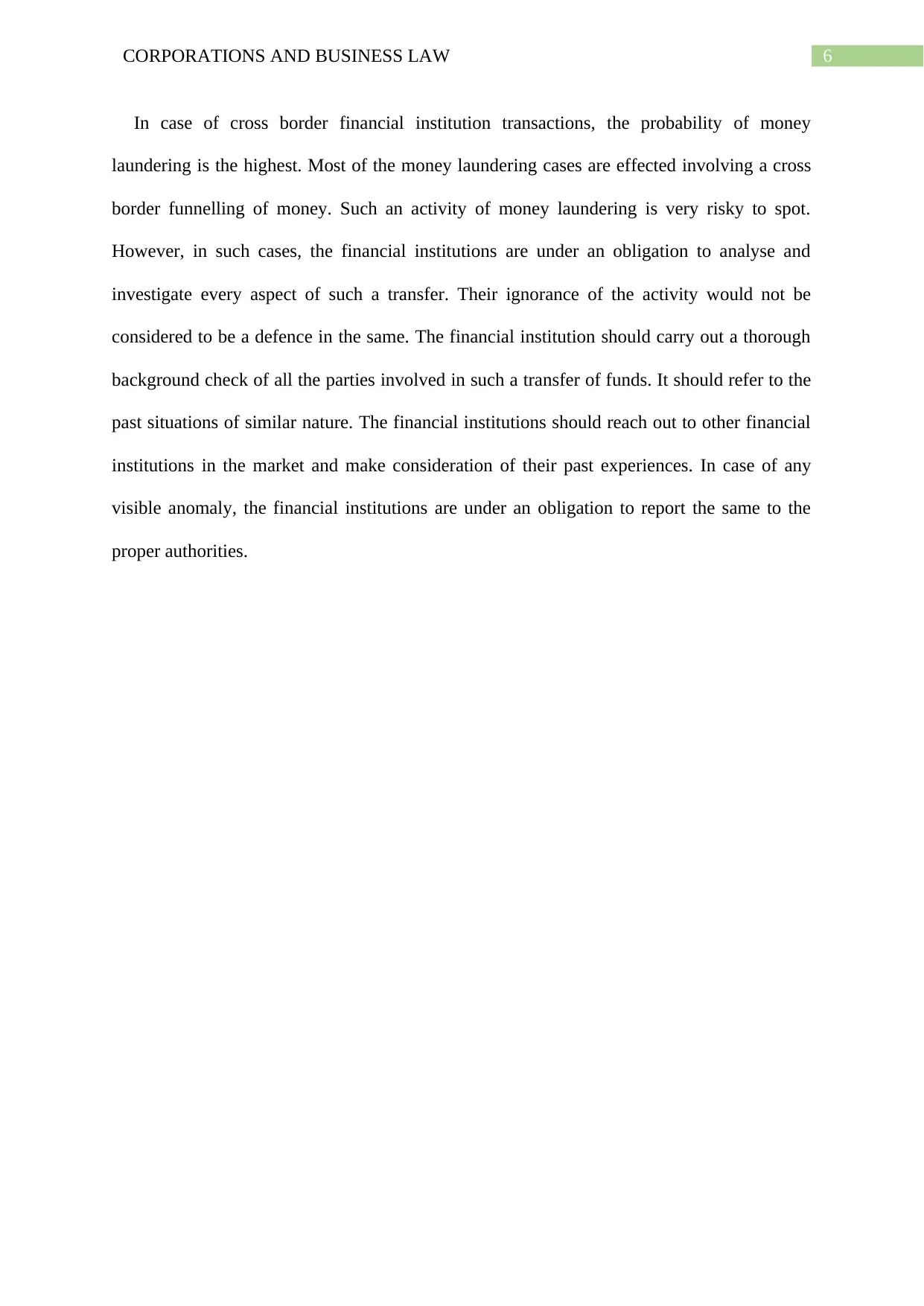
6CORPORATIONS AND BUSINESS LAW
In case of cross border financial institution transactions, the probability of money
laundering is the highest. Most of the money laundering cases are effected involving a cross
border funnelling of money. Such an activity of money laundering is very risky to spot.
However, in such cases, the financial institutions are under an obligation to analyse and
investigate every aspect of such a transfer. Their ignorance of the activity would not be
considered to be a defence in the same. The financial institution should carry out a thorough
background check of all the parties involved in such a transfer of funds. It should refer to the
past situations of similar nature. The financial institutions should reach out to other financial
institutions in the market and make consideration of their past experiences. In case of any
visible anomaly, the financial institutions are under an obligation to report the same to the
proper authorities.
In case of cross border financial institution transactions, the probability of money
laundering is the highest. Most of the money laundering cases are effected involving a cross
border funnelling of money. Such an activity of money laundering is very risky to spot.
However, in such cases, the financial institutions are under an obligation to analyse and
investigate every aspect of such a transfer. Their ignorance of the activity would not be
considered to be a defence in the same. The financial institution should carry out a thorough
background check of all the parties involved in such a transfer of funds. It should refer to the
past situations of similar nature. The financial institutions should reach out to other financial
institutions in the market and make consideration of their past experiences. In case of any
visible anomaly, the financial institutions are under an obligation to report the same to the
proper authorities.
Paraphrase This Document
Need a fresh take? Get an instant paraphrase of this document with our AI Paraphraser
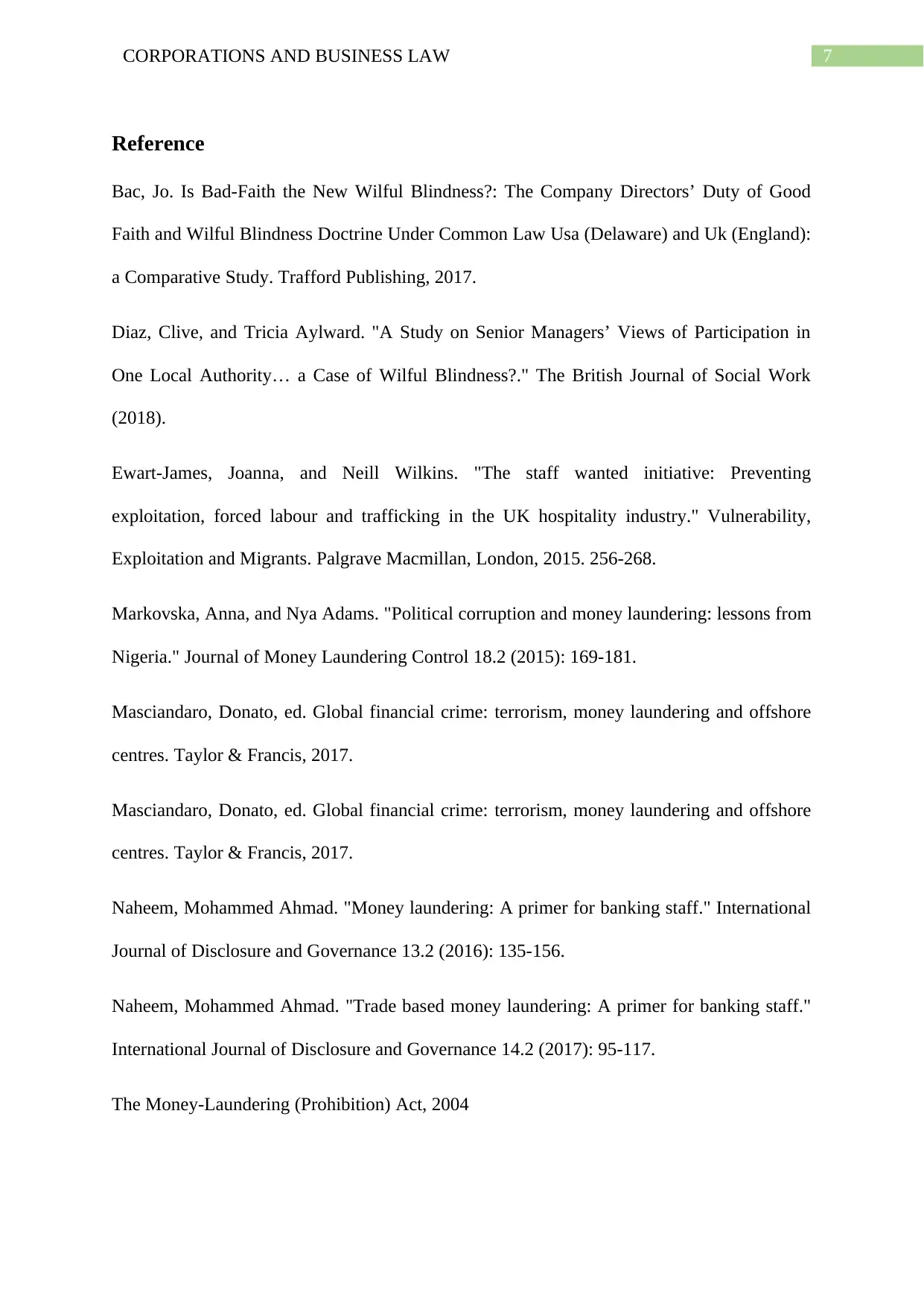
7CORPORATIONS AND BUSINESS LAW
Reference
Bac, Jo. Is Bad-Faith the New Wilful Blindness?: The Company Directors’ Duty of Good
Faith and Wilful Blindness Doctrine Under Common Law Usa (Delaware) and Uk (England):
a Comparative Study. Trafford Publishing, 2017.
Diaz, Clive, and Tricia Aylward. "A Study on Senior Managers’ Views of Participation in
One Local Authority… a Case of Wilful Blindness?." The British Journal of Social Work
(2018).
Ewart-James, Joanna, and Neill Wilkins. "The staff wanted initiative: Preventing
exploitation, forced labour and trafficking in the UK hospitality industry." Vulnerability,
Exploitation and Migrants. Palgrave Macmillan, London, 2015. 256-268.
Markovska, Anna, and Nya Adams. "Political corruption and money laundering: lessons from
Nigeria." Journal of Money Laundering Control 18.2 (2015): 169-181.
Masciandaro, Donato, ed. Global financial crime: terrorism, money laundering and offshore
centres. Taylor & Francis, 2017.
Masciandaro, Donato, ed. Global financial crime: terrorism, money laundering and offshore
centres. Taylor & Francis, 2017.
Naheem, Mohammed Ahmad. "Money laundering: A primer for banking staff." International
Journal of Disclosure and Governance 13.2 (2016): 135-156.
Naheem, Mohammed Ahmad. "Trade based money laundering: A primer for banking staff."
International Journal of Disclosure and Governance 14.2 (2017): 95-117.
The Money-Laundering (Prohibition) Act, 2004
Reference
Bac, Jo. Is Bad-Faith the New Wilful Blindness?: The Company Directors’ Duty of Good
Faith and Wilful Blindness Doctrine Under Common Law Usa (Delaware) and Uk (England):
a Comparative Study. Trafford Publishing, 2017.
Diaz, Clive, and Tricia Aylward. "A Study on Senior Managers’ Views of Participation in
One Local Authority… a Case of Wilful Blindness?." The British Journal of Social Work
(2018).
Ewart-James, Joanna, and Neill Wilkins. "The staff wanted initiative: Preventing
exploitation, forced labour and trafficking in the UK hospitality industry." Vulnerability,
Exploitation and Migrants. Palgrave Macmillan, London, 2015. 256-268.
Markovska, Anna, and Nya Adams. "Political corruption and money laundering: lessons from
Nigeria." Journal of Money Laundering Control 18.2 (2015): 169-181.
Masciandaro, Donato, ed. Global financial crime: terrorism, money laundering and offshore
centres. Taylor & Francis, 2017.
Masciandaro, Donato, ed. Global financial crime: terrorism, money laundering and offshore
centres. Taylor & Francis, 2017.
Naheem, Mohammed Ahmad. "Money laundering: A primer for banking staff." International
Journal of Disclosure and Governance 13.2 (2016): 135-156.
Naheem, Mohammed Ahmad. "Trade based money laundering: A primer for banking staff."
International Journal of Disclosure and Governance 14.2 (2017): 95-117.
The Money-Laundering (Prohibition) Act, 2004
1 out of 8
Related Documents
Your All-in-One AI-Powered Toolkit for Academic Success.
+13062052269
info@desklib.com
Available 24*7 on WhatsApp / Email
![[object Object]](/_next/static/media/star-bottom.7253800d.svg)
Unlock your academic potential
Copyright © 2020–2026 A2Z Services. All Rights Reserved. Developed and managed by ZUCOL.




